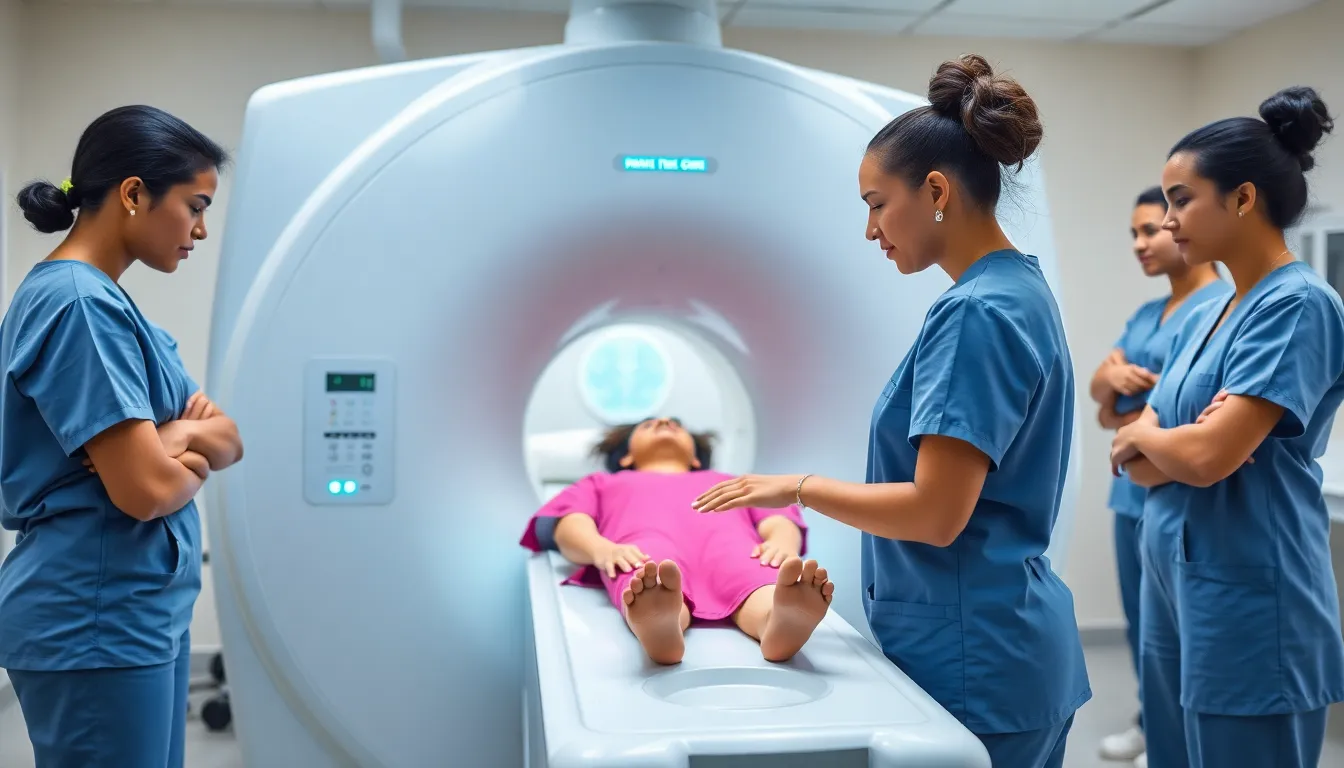In a world where superheroes wear lab coats instead of capes, MRI techs are the unsung champions of medical imaging. They wield machines that can see inside our bodies like X-ray vision, helping doctors diagnose everything from sprained ankles to mysterious ailments. But before they can don that lab coat, aspiring techs need the right training.
Table of Contents
ToggleOverview of MRI Tech Training Program
An MRI tech training program encompasses specialized education focused on magnetic resonance imaging technology. Participants learn to operate MRI machines and ensure patient safety during procedures. Coursework typically includes anatomy, patient care, and imaging techniques, providing a robust foundation for aspiring technicians.
Hands-on clinical experience forms a crucial part of this training. Students practice in medical settings to develop proficiency in equipment operation and patient interaction. Shadowing experienced MRI technologists offers valuable insights into real-world applications.
Certification is essential for MRI technologists. Graduates often pursue credentials from recognized organizations such as the American Registry of Radiologic Technologists (ARRT). Acquiring this certification entails passing an exam that evaluates knowledge and skills essential for the role.
Duration of MRI tech training programs varies. Programs commonly range from one to two years, depending on the degree type, with associates degrees being the most prevalent. Online and hybrid options are increasingly available, catering to diverse learning preferences.
Job opportunities for MRI technicians are expanding. As demand for medical imaging continues to rise, professionals find ample employment options in hospitals, clinics, and imaging centers. Competitive salaries and benefits contribute to the appeal of this career path.
Ultimately, the MRI tech training program equips individuals with the expertise and credentials necessary to excel in a vital healthcare profession.
Curriculum Structure

The curriculum structure of MRI tech training programs encompasses vital educational components. Students engage in various subjects and gain practical experience through clinical exposure.
Core Subjects
Core subjects include anatomy, physiology, and imaging techniques. In-depth knowledge of human anatomy ensures technicians understand the structures they image. Techniques in MRI focus on operating machines and optimizing image quality. Patient care classes emphasize communication and support during scans. Safety protocols are taught to protect both patients and staff from radiation and other risks. These subjects form the foundation for a successful career in MRI technology.
Practical Experience
Practical experience is essential in an MRI tech training program. Students must complete clinical hours under supervision to apply theoretical knowledge. Internships in local hospitals or imaging centers allow for hands-on learning. Participants practice positioning patients and operating MRI machines in real-world settings. Shadowing experienced MRI technologists enhances skills and knowledge. Such practical exposure builds confidence and prepares graduates for workplace challenges.
Certification and Licensing
Certification and licensing are critical for MRI technicians, ensuring they meet industry standards and provide safe, effective care.
National Certification
National certification from the American Registry of Radiologic Technologists (ARRT) represents a significant milestone for MRI technologists. Graduates of MRI tech programs must pass the ARRT examination to demonstrate their proficiency in imaging techniques and patient safety. The exam tests knowledge gained during training, assessing both theoretical and practical skills. Maintaining certification requires ongoing education, ensuring professionals stay current with advancements in technology and techniques. This commitment to lifelong learning enhances the quality of care provided to patients.
State Requirements
State requirements for MRI technicians vary across the United States, with some states mandating specific licensure. Licensing entails passing state examinations or meeting particular educational criteria. Many states recognize ARRT certification, allowing MRI technologists to practice once they fulfill local requirements. Regulations may include background checks and continuing education credits to maintain licensure. Understanding these state-specific regulations is crucial for aspiring MRI techs, as compliance ensures legal practice and enhances career opportunities.
Career Opportunities
MRI technicians play pivotal roles in medical settings, where their expertise opens doors to numerous career paths. As advancements in imaging technology continue, the demand for skilled MRI techs rises.
Job Prospects
Job prospects for MRI technicians remain robust, with the Bureau of Labor Statistics projecting a 9% employment growth from 2020 to 2030. Hospitals, outpatient care centers and diagnostic laboratories actively seek qualified technologists to meet patient needs. Job availability often correlates with geographic location, as urban regions typically offer more opportunities. Competitive salaries increase appeal, with annual earnings averaging $75,000, depending on experience and location. It’s essential for MRI technicians to stay current with developments in imaging techniques to enhance employability.
Specializations
MRI technicians can pursue various specializations for career advancement. Advanced imaging techniques, such as functional MRI and cardiac MRI, often require additional training. Specializations can lead to higher earning potential and unique job opportunities. Some technologists choose to focus on pediatrics or oncology, tailoring their skills to specific patient demographics. Others pursue roles in research or education, contributing to the field’s growth. Each specialization enhances the technician’s versatility, impacting career trajectory and job satisfaction.
Embarking on a career as an MRI technician opens doors to a rewarding profession in healthcare. With the right training program and certification, individuals can become vital members of the medical imaging team. The combination of theoretical knowledge and hands-on experience equips them with the skills needed to excel.
As the demand for MRI services continues to grow, aspiring techs can look forward to a bright future filled with diverse opportunities. Specializations within the field further enhance their career prospects, allowing them to focus on areas that align with their interests. By investing in quality education and staying updated with industry advancements, MRI technicians can build fulfilling careers that contribute significantly to patient care and medical diagnostics.